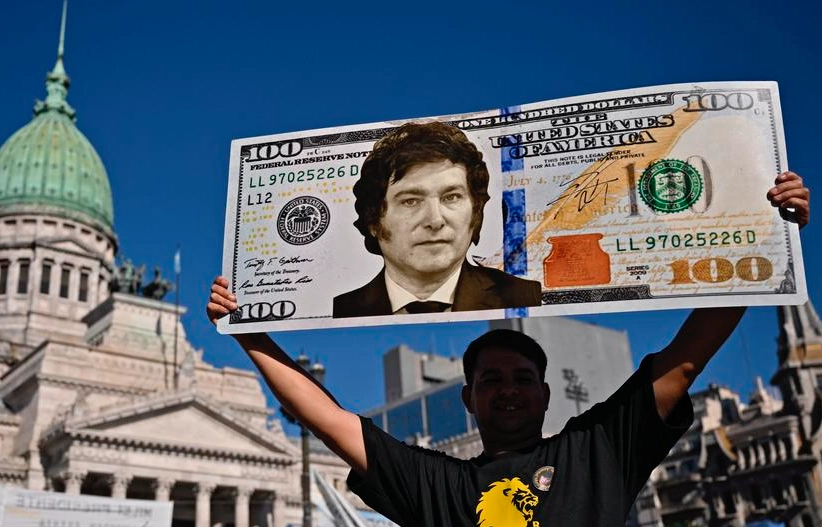On December 10, 2023, Javier Milei, an economist conceived as an outsider without a strong party structure, assumed the presidency of Argentina. This also marked the end of the year of the highest inflation in the last three decades. Given the problem’s acute nature and previous governments’ failure to provide answers from the state, it is not surprising that voters chose an economist with libertarian proposals, who in his campaign emphasized the resolution of this scourge afflicting Argentines through an extraordinary proposal: dollarization. Three months after the presidential inauguration, the inflationary process is deepening while the obstacles (especially legislative ones) for the new government to ensure its stability and success are multiplying.
At the beginning of its term of office, the new government announced some 10 measures whose repercussions harmed the population’s living conditions. One of them was the strong devaluation of the currency, which brought inflation in December to 25%. The government’s diagnosis later strengthened other measures that the country was immersed in a tangle of regulations that would be the cause of inflation. Thus, on December 21, Javier Milei announced a wide and diverse Decree of Necessity and Urgency (DNU), whose objective was to deregulate the economy. One of its main objectives was to implement a labor reform that would alleviate labor costs and take power away from the unions. Considering the interests affected by the proposal, it was to be expected that the DNU would be subject to judicial proceedings, which occurred during the first two months of the administration. The labor chapter of the DNU was the one that provoked the most injunctions. In a way, it could be said that this DNU, except in a few aspects, has been held up by the courts while it is still waiting to be dealt with in the National Congress and the Supreme Court of Justice.
Parallel to the decree, President Javier Milei sent bills to Congress, pre-announced before the end of 2023 together with the call for extraordinary sessions. The so-called “omnibus law” added further deregulations in other sectors and the request to the legislature for a disproportionate amount of delegated powers. Regarding the latter, it is worth mentioning that, although all governments in Argentina request them upon taking office, they do so with shorter terms and in a smaller proportion, implying strong discussions in Congress. Indeed, this happened once, during the first half of January, the deputies met in three commissions, being this request for delegated powers was one of the aspects that aroused the most criticism, dialogues, and fervent negotiations. Insofar as the government has a few legislators in Congress, negotiations were tough, and the positive results were ambiguous or questionable. This, even though the ruling bloc could take advantage of the support of Propuesta Republicana (PRO) and part of the Unión Cívica Radical (UCR), which once formed Juntos por el Cambio. In fact, in the negotiations, both in the commissions and once the bill passed to the floor for discussion, these two political forces together with other smaller ones were the only ones willing to dialogue and negotiate, considering the provinces they govern. After long discussions, on Friday, February 2, the bill was approved in its general version by a majority of 144 against 109 opponents, mainly from the Unión por la Patria (UXP) and the Frente de Izquierda de los Trabajadores (FIT). Unusually, however, when on Tuesday, February 6, the bill began to be dealt with in particular, and once it noticed that the limitations that were being placed on the law did not seem pertinent, the ruling party went back to square one of the bill. Uncertainty reigns again.
On the way to the third month of government, the economic measures taken at the beginning of the term add up to massive increases in taxes and tariffs. In a context where the government’s legislative tools to deregulate the economy and lower inflation do not bode well for the future, everything is getting more complicated, and one of the possible horizons is nothing less than ungovernability. Will an inexperienced government be able to exercise control in an unprecedented crisis?
In this context, some alternatives are suggested, such as the institutionalization of the alliance with the PRO, and an open speculation of analysts and leaders of that party, such as Patricia Bullrich, who is already part of the government as Minister of Security. On the other hand, it is to be expected that, given the first legislative failures, the government will change its strategy and abandon its ambitious “omnibus” mega-bill for bills by topics. If these alternatives do not advance, a third scenario toward the 100 days of administration may be an “Argentina-style bukelization”, where the fundamental piece of the government is dollarization, especially when recognizing the absence of a stabilization plan. In doing so, Javier Milei — who defeated Peronism in 2023 — would be, paradoxically, repeating the economic policy of Carlos Menem, another Peronist who was elected president 35 years ago.
*Translated by Janaína Ruviaro da Silva from the original in Spanish.











